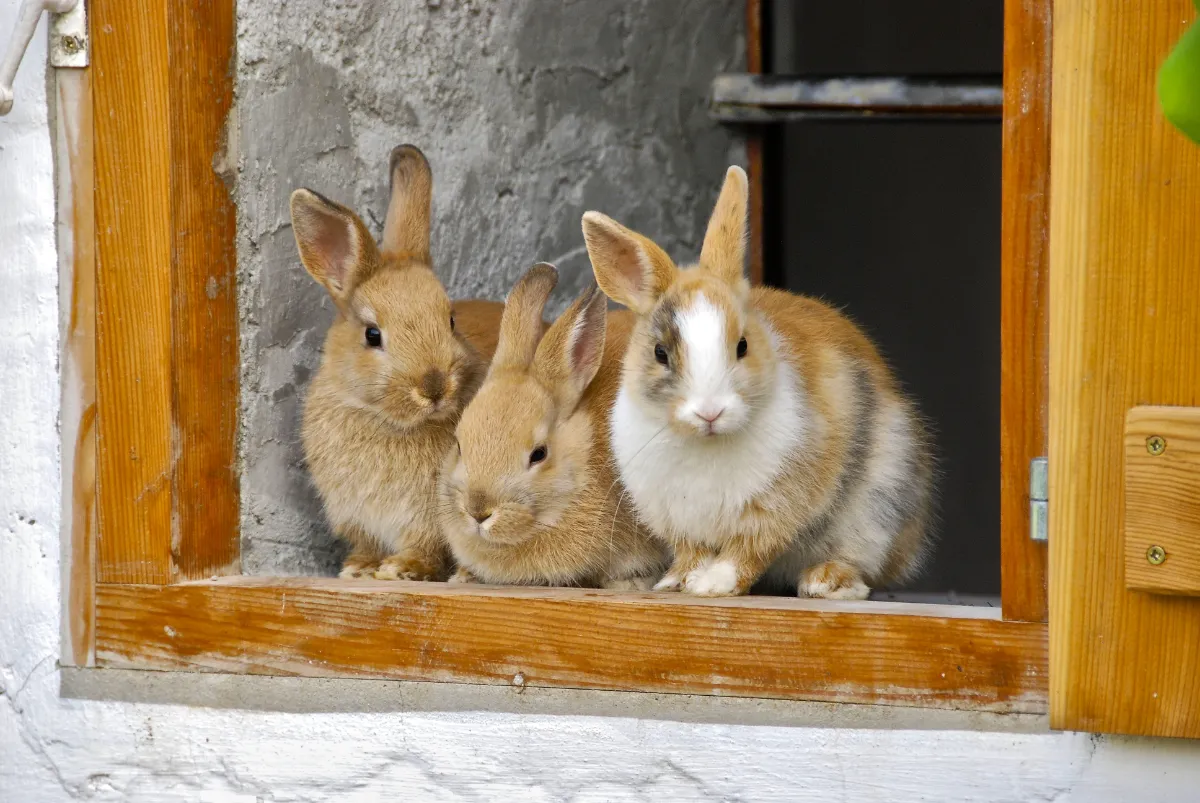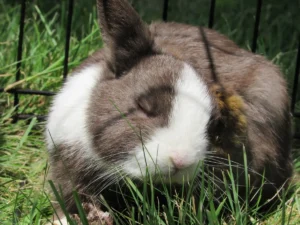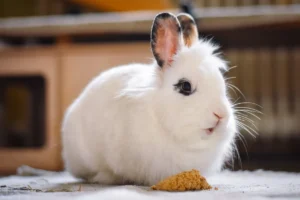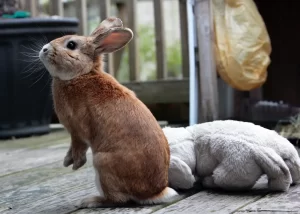Did you know that approximately 80% of unneutered rabbits struggle to live harmoniously together?
If you’re considering keeping two unneutered rabbits under the same roof, there are several challenges and risks you need to be aware of. From understanding rabbit hierarchy and dominance to managing hormonal behavior, proper socialization is key.
In this article, we’ll explore strategies for introducing unneutered rabbits and signs of compatibility to help ensure a successful coexistence. Additionally, we’ll discuss the importance of considering neutering and bonding as alternatives.
In This Article
- 1 Key Takeaways
- 2 The Challenges of Keeping Unneutered Rabbits Together
- 3 Understanding Rabbit Hierarchy and Dominance
- 4 Hormonal Behavior in Unneutered Rabbits
- 5 The Importance of Proper Socialization
- 6 Potential Risks and Health Concerns
- 7 Strategies for Introducing Unneutered Rabbits
- 8 Signs of Compatibility and Successful Coexistence
- 9 Considering the Alternatives: Neutering and Bonding
- 10 Frequently Asked Questions
- 10.1 Can Two Unneutered Rabbits Live Together Without Any Challenges or Dominance Issues?
- 10.2 Is It Possible to Prevent Hormonal Behavior in Unneutered Rabbits Through Socialization?
- 10.3 What Are the Most Common Health Risks and Concerns Associated With Keeping Unneutered Rabbits Together?
- 10.4 Are There Any Specific Strategies or Techniques That Can Help Successfully Introduce Unneutered Rabbits to Each Other?
- 10.5 If Keeping Unneutered Rabbits Together Is Not Recommended, What Are the Alternatives for Bonding Rabbits?
- 11 Conclusion
Key Takeaways
- Approximately 80% of unneutered rabbits struggle to live harmoniously together.
- Unneutered rabbits can reproduce rapidly, leading to an overpopulation issue.
- Managing territorial aggression can be a challenge with unneutered rabbits.
- Keeping unneutered rabbits together can result in injuries, stress, and poor welfare.
The Challenges of Keeping Unneutered Rabbits Together
Are you aware of the challenges that come with keeping unneutered rabbits together?
When two unneutered rabbits are kept together, it can have a significant impact on the rabbit population. Rabbits have a high breeding rate, and if left unneutered, they can reproduce rapidly, leading to an overpopulation issue. This can be a concern for both individual rabbit owners and animal shelters that may struggle to find homes for all the offspring.
Additionally, managing territorial aggression can be a challenge when unneutered rabbits are kept together. Unneutered male rabbits tend to be more aggressive and territorial, leading to conflicts within the living space. This can result in injuries, stress, and overall poor welfare for the rabbits.
Therefore, it’s essential to carefully consider the potential challenges before deciding to keep unneutered rabbits together.
Understanding Rabbit Hierarchy and Dominance
You may find it interesting to learn about rabbit hierarchy and dominance, as it plays a significant role in their social interactions. Understanding rabbit behavior can help you create a harmonious environment for your furry companions.
Rabbits are social animals that establish dominance within their group. In any rabbit pair or group, there will be a dominant rabbit and a subordinate rabbit. The dominant rabbit asserts its dominance through various behaviors such as chasing, nipping, or mounting the subordinate rabbit.
It’s essential to recognize these behaviors and intervene if necessary to prevent any injuries. When introducing rabbits to each other, it’s crucial to allow them to establish their dominance naturally, but always monitor their interactions closely.
Hormonal Behavior in Unneutered Rabbits
Understanding the hormonal behavior in unneutered rabbits can help you address any challenges that may arise in their interactions.
Unneutered rabbits, both males and females, can exhibit unwanted breeding behaviors due to their natural instinct to reproduce. Males may become more territorial and aggressive, while females can be moody and unpredictable.
It’s important to be aware of these behaviors and take appropriate measures to prevent unwanted breeding. One option is to separate unneutered rabbits of opposite genders to avoid accidental mating.
Additionally, aggression issues can arise between unneutered rabbits, especially if they’re of the same gender. Providing enough space, enrichment, and supervised introductions can help minimize aggressive behaviors.
However, it’s crucial to consult with a veterinarian or a rabbit behavior specialist for guidance and to discuss the potential benefits of neutering your rabbits to address these challenges effectively.
The Importance of Proper Socialization
Properly socializing your rabbits from a young age can help prevent behavioral issues and ensure they have positive interactions with other rabbits. Early socialization is crucial for the overall well-being of your rabbits, as it allows them to develop important social skills and adapt to different environments. Human interaction plays a significant role in the socialization process, as it helps rabbits build trust and confidence. By spending time with your rabbits, handling them gently, and exposing them to various stimuli, you can help them become comfortable with human touch and interaction. This will make it easier for them to form bonds with other rabbits and humans in the future.
To emphasize the benefits of early socialization and the role of human interaction, let’s take a look at the following table:
| Benefits of Early Socialization | Role of Human Interaction |
|---|---|
| Builds social skills | Builds trust and confidence |
| Prevents behavioral issues | Helps rabbits adapt |
| Promotes positive interactions | Establishes bonds |
| Enhances overall well-being | Builds comfort with touch |
Potential Risks and Health Concerns
When it comes to potential risks and health concerns, it’s important to be aware of the possible dangers and take necessary precautions.
When considering the well-being of your loved ones, it’s crucial to understand the risks that certain activities or situations may pose to their health.
Whether it’s participating in high-intensity physical activities without proper warm-up or exposing oneself to hazardous substances, being informed about potential health concerns is vital.
By staying knowledgeable and experienced, you can ensure the safety and well-being of those you serve.
It’s essential to educate yourself on the potential risks and health concerns associated with various activities, environments, or products.
By doing so, you can take appropriate measures to mitigate these risks and protect the health of yourself and others.
Strategies for Introducing Unneutered Rabbits
You should start by gradually introducing two unneutered rabbits in a neutral space to minimize territorial aggression. Unneutered rabbit dynamics can be complex, but with a careful and gradual introduction process, it is possible for them to live together harmoniously.
To help you understand the steps involved, let’s break it down into a simple table:
| Step | Description | Emotional Response |
|---|---|---|
| 1 | Create a neutral space | Relieved, hopeful |
| 2 | Monitor body language and behavior | Anxious, cautious |
| 3 | Gradually increase time together | Excited, optimistic |
Signs of Compatibility and Successful Coexistence
The key to successful coexistence between two unneutered rabbits is recognizing the signs of compatibility and fostering a harmonious relationship. When introducing two unneutered rabbits, it’s important to understand the dynamics of their relationship and make behavior modifications accordingly.
Pay close attention to their body language and vocalizations. Signs of compatibility include relaxed postures, grooming each other, and playing together. On the other hand, aggressive behaviors such as chasing, biting, or mounting can indicate conflict. In such cases, behavior modifications may be necessary.
This can involve providing separate living spaces and gradually reintroducing the rabbits under supervision. Additionally, neutering can help reduce hormonal aggression and increase the chances of successful coexistence.
Considering the Alternatives: Neutering and Bonding
Consider neutering your unneutered rabbit as an alternative to promote bonding and reduce hormonal aggression.
Neutering your rabbit has several benefits that can significantly improve their overall well-being and enhance their compatibility with other rabbits. Neutering not only eliminates the risk of unwanted pregnancies but also reduces the likelihood of territorial and aggressive behaviors. By removing the source of hormonal aggression, neutering creates a calmer and more relaxed environment, which is crucial for successful bonding.
When introducing two rabbits, it’s important to follow proper bonding techniques to ensure a smooth transition. This includes gradual introductions in a neutral territory, supervised playtime, and providing plenty of hiding spots and resources.
Neutering, combined with effective bonding techniques, can greatly increase the chances of a harmonious and loving relationship between your rabbits.
Frequently Asked Questions
Can Two Unneutered Rabbits Live Together Without Any Challenges or Dominance Issues?
Without neutering, two unneutered rabbits living together may face challenges and dominance issues. Unneutered rabbits are more prone to territorial behavior, fighting for dominance, and aggressive behavior towards each other.
Is It Possible to Prevent Hormonal Behavior in Unneutered Rabbits Through Socialization?
Preventing hormonal behavior in unneutered rabbits through socialization is possible. By introducing them slowly, providing plenty of space and enrichment, and monitoring their interactions, you can create a harmonious environment for them to live together.
What Are the Most Common Health Risks and Concerns Associated With Keeping Unneutered Rabbits Together?
The most common health risks and concerns associated with keeping unneutered rabbits together include potential aggression and fighting, as well as an impact on their reproductive health. It is important to be knowledgeable and experienced in handling such situations.
Are There Any Specific Strategies or Techniques That Can Help Successfully Introduce Unneutered Rabbits to Each Other?
To successfully bond two unneutered rabbits, it’s important to use specific strategies and techniques during the introduction process. Socialization techniques and a gradual approach can help ensure a successful and harmonious living situation.
If Keeping Unneutered Rabbits Together Is Not Recommended, What Are the Alternatives for Bonding Rabbits?
If keeping unneutered rabbits together is not recommended, there are alternative bonding methods available. Neutering can help with behavioral changes in rabbits and increase the chances of successful bonding between them.
Conclusion
In conclusion, it can be challenging to keep two unneutered rabbits together due to their hormonal behavior and the potential risks involved. However, with proper socialization and careful introduction strategies, compatibility and successful coexistence can be achieved.
It’s interesting to note that according to a study conducted by the House Rabbit Society, neutering rabbits can reduce aggression and improve their overall health, making it an important consideration for those seeking to keep rabbits together.





